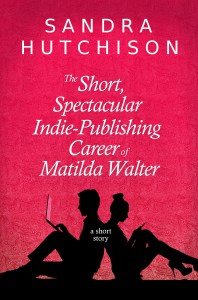
What you see here is what is known in babies as failure to thrive. In a book, it’s called not having legs. Or stinking up the joint.
When I ran a Kindle Countdown Deal for The Awful Mess, that spike went up hundreds of units further and stayed up, slowly settling even after my paid promotions ended. Because the book had done well enough that it went a bit viral, it rose in Amazon’s algorithms, and actually made more money for me after the promotion than during it.
That’s not going to happen this time. No wonder BookBub turned this one down. They know the market better than I do.
So, something didn’t work here. I can’t blame my paid promotions, either — I got noticeable bumps each day from E-Reader News Today (also known as “ENT,” and the biggest one), Fussy Librarian, Choosy Bookworm, One Hundred Free Books, and a few others. Just not enough to get them or me excited. I’m sure I also could have done more legwork to prep this and keep it going, but that’s true of everything in marketing. (I even tried boosting a Facebook post for the first time ever, with dismal results.)
Truth: Any given promotion will absorb whatever time and money you are willing to give it.
So now I need to do a postmortem, though it’s arguably a few days early. (The book is still discounted, though not as much, through Sunday.) But I doubt the questions will change much.
What went wrong?
Could it be the lovely, evocative, award-winning, but kind of bleak cover? Would the midriff cover (at left) have worked better than the one I chose? (In theory, I could test this.)

Is it the overly-long, overly-literary title? (I could test that one, too. Not that I want to. I can be pretty stubborn, and I love that title.)
Is it simply that it IS a literary novel instead of an HEA (Happy Ever After) romance? (Not much to be done about that, and it’s true — genre fiction usually does better, at least until a book becomes that one book everyone is supposed to read — and that doesn’t happen very often.)
Was it my product description? (I just revised it, but it’s too late to make much difference. And for all I know I’ve made it worse.)
Is it not as well written? I don’t believe that. Feedback has generally been that it is better written, if not as much of a crowd-pleaser. I did choose to begin with an airplane crash and a wake. I have to keep reminding myself that I knew that was asking a lot of my readers going in.
This is a moment when I’m glad to be an indie author, able to tweak to my heart’s content.
But first, this is also a moment when I must acknowledge that a seasoned editor or publisher might have said, “I’m sorry, but this book simply isn’t going to work.” At least one fellow author warned me off on many counts, including cover, title, and less-than-idealized hero. I thanked her and went ahead anyway.
This happens to traditionally-published authors all the time, of course, whether the book is published and does poorly or never makes it out of the gate. As an indie it won’t impact my future career in any irrevocable way (at least since I wasn’t expecting to make a living doing this anytime soon).
In the meantime, I’m still proud of this book and glad it’s been published, because I’d like it to be read, and it has been — just not by as many folks as I’d hoped. I’ve enjoyed the feedback I’ve gotten. (I’ll have more about that next week). I also think it could save a girl or two from experiencing what Molly does.
And then there’s the reality that I could get hit by a truck tomorrow. At least this child of mine is out in the world. But is this really a case of unfortunate indie impatience? Could be. I’m at that point in life, though, when I vastly prefer asking forgiveness to asking permission.
Unfortunately, any changes I make now would be a bit hard to measure. Selling books is like sailing in that you have to be making some headway in the first place in order to execute a good tack. Otherwise, you could just stall and drift, sails flapping uselessly.
It’s not all bad news, of course. The book has done well in most reviews and has been well-received by most — but not all — of my readers. And the next novel, thankfully, does have a happy-ever-after romance in it.
In the meantime, since I was already searching for some more wind for those sails, I have put together a collection of short stories called Missionary Dating and Other Stories that is now available for pre-order on Amazon, releasing June 30. It’s 99 cents now, but that will go up once it has enough reviews. (God willing.)
The people on my mailing list will get the first two stories in Missionary Dating free later this week. I’m also going to be republishing my perma-free comic story soon, with a better cover, if only because I can now say that yes, despite the lack of reviews, it did keep a steady dribble of sales on my other books coming in, especially on the other retailers.
A BIG HUG AND THANK YOU to all who helped me get the word out! I really appreciate your efforts. (And I’ll happily accept any advice right about now, even if I may not follow it.)
If you’re a writer who’s feeling less than illustrious yourself at the moment, you might enjoy this article in the Guardian in which seven writers reflect on their failures. Of course, they are all successful now or they wouldn’t have been asked to contribute, so it may not be quite what you’re looking for. Still, I think most writers can relate to Anne Enright on this:
Failure is easy. I do it every day, I have been doing it for years. I have thrown out more sentences than I ever kept, I have dumped months of work, I have wasted whole years writing the wrong things for the wrong people. Even when I am pointed the right way and productive and finally published, I am not satisfied by the results. This is not an affectation, failure is what writers do. It is built in. Your immeasurable ambition is eked out through the many thousand individual words of your novel, each one of them written and rewritten several times, and this requires you to hold your nerve for a very long period of time – or forget about holding your nerve, forget about the wide world and all that anxiety and just do it, one word after the other.
And I can’t really think of a better note to end on than that.
Like this:
Like Loading...
 Bless you, Jon (or John) Ha. I didn’t want to have to pay for formatting, since I hope this updated version of The Short, Spectacular Indie-Publishing Career of Matilda Walter will soon be perma-free once again. (It already is free at Smashwords.) It has a new chick lit cover (mine, but done with a lot more care than the first cover) and updated back matter.
Bless you, Jon (or John) Ha. I didn’t want to have to pay for formatting, since I hope this updated version of The Short, Spectacular Indie-Publishing Career of Matilda Walter will soon be perma-free once again. (It already is free at Smashwords.) It has a new chick lit cover (mine, but done with a lot more care than the first cover) and updated back matter.
















